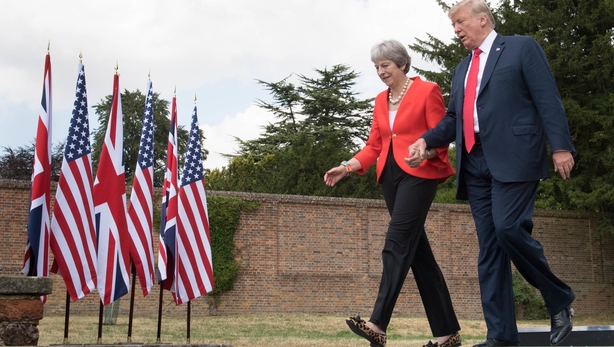This week marked the second anniversary of Theresa May becoming British Prime Minister. Celebrating such a milestone on Friday the 13th might seem ironic. Celebrating it alongside a US President who has just criticised your policies, and lauded your nemesis, in a newspaper interview must have seemed more like the stuff of nightmares.
Two years ago Mrs May stood on the steps of Downing Street and spoke of wanting to help those who were "just managing". She is also just managing - in Mrs May's case though, it is just managing to retain her premiership and control on her party. Part of the reason that she has stayed in power has been the lack of any bold moves on the major political issue of the day - Brexit.
With her party so divided on the issue, staying still has often been seen as the safest political move. But it could never be a long-term strategy and so last week’s events in Chequers changed everything.
Once Theresa May released the document after her cabinet away day, the die was cast. A vision of Brexit had emerged which was never going to be palatable to those whose vision of Brexit could not be more different.

Back me or sack me, Conservative leader John Major told his party in 1995. In a bid to focus minds and get his MP’s to unite behind him, Mr Major dramatically resigned as leader and then submitted his name for the leadership contest. He duly won, although the divisions which had led to his resignation did not heal, and two years later the Conservatives were out of power as Labour swept in a landslide.
The contentious issue for the Conservative Party in 1995? Europe. The more things change, the more they stay the same.
Like John Major, Theresa May has to face down a section of her party who disagree strongly with her. The Eurosceptics in the Tory Party were the bane of John Major’s life. They fully intend to play the same role in Mrs May’s premiership. The crucial difference? In Mrs May’s party they have a mandate in the form of the EU Referendum result.
The years since the Brexit vote has often felt as if British politics is moving inexorably towards a collision point. A point which was always on the horizon, but just out of reach. The events of the last week has brought the collision point far closer.
Listen: RTÉ's Brexit Republic podcast with Tony Connelly and Colm Ó Mongáin
It says something about the volatility of this week that an explosive interview with a US President who is visiting the UK might also have provided a welcome, if deeply awkward, distraction from other woes for the Prime Minister.
The visit of the US President this week crystallises the concerns of both sides in the Brexit debate. Mr Trump told The Sun newspaper that Mrs May's Brexit approach could 'kill off' a free trade deal with the US, but the next day branded the interview 'fake news'.
For Leavers, staying too close to the EU to be able to pursue free trade deals is a major concerns. For Remainers, having to rely increasingly on a US presidency which is inconsistent in its pronouncements highlights the concern about leaving an EU bloc which has been their home for forty years.
The days ahead remain crucial for Theresa May. Next week she will face important votes on the Customs and Trade Bills as they return to the Commons. She will also face a statement in the House from Boris Johnson, whose departure from Cabinet threw her premiership into such crisis. If she can get to the Parliamentary recess on 24 July she has bought herself the summer weeks. But she will only have deferred crisis, not defused it.
The return of Parliament, facing her party faithful at the Tory Conference in October, and the final deluding on Brexit all provide hurdles which the strongest of leaders would find it difficult to navigate. Perhaps the best Theresa May can hope for right now is that she just about manages.




